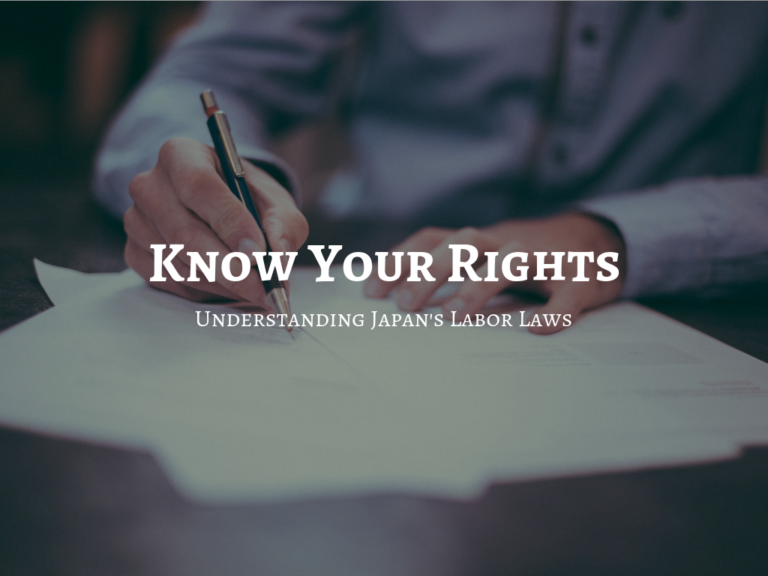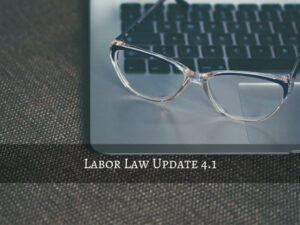
Labor Laws in Japan
Japan’s labor laws are vastly different from other countries. Unlike places like the U.S. where employees are sometimes famously fired at-will and without cause, Japan’s laws are designed to protect the employees, making it very difficult for a company to fire an employee without cause and ample amounts of evidence.
In order to determine your rights as an employee, it is first essential to figure out what kind of employee you are. There are several types of employees, and different rights you might be entitled to depending on status:
Full-Time Employee (Seishaiin – 正社員)
This is what you may want if you are working in Japan, because it offers you job security, provides visa support, the ability to get a bank account and rent a place, etc. Once you pass the probationary period, it is almost impossible for a company to fire you without cause (“cause” means “severe misconduct” on your part). Like the contract employee, you are entitled to regular paid vacation as required by law. One of the downsides (though there are ample upsides, as well) to this type of employment is that you are often manipulated into working unpaid overtime, which is how companies get away with notoriously long hours at the office without spending extra money.
Contractor (Keiyaku Shaiin – 契約社員)
You have a little bit more job security under this classification, however, the employer can decide not to renew your contract (usually employment is a 1-year term) without triggering negative repercussions. After 5 consecutive years under this type of arrangement the company may be required, by law, to offer you a Seishaiin (正社員) contract. Under the Keiyaku Shaiinarrangement, you are entitled to regular continuation of your terms & conditions, absent “cause.”
Part-Time Employee (Arubaito – アルバイト)
This class of employee unfortunately doesn’t have much job security except possibly for breach-of-contract (if you’re lucky enough to have one). Employers can still get into trouble for wrongful termination and not playing by the rules, but for the part-timer, it usually isn’t worth the uphill battle if a fight ensues.
Common Pitfalls for Foreign workers
In addition to the types of employment in Japan, here are a few other things you should know to ensure that you aren’t being taken advantage of as a foreign employee:
Vacation Days
At a bare minimum, companies generally allocate 10 paid vacation days from the first year of employment. You are entitled to these as soon as you clear 6-months at the company and in theory, can take these whenever you wish (with advanced notice and authorization from your direct supervisor or HR.) In practice, however, Japanese work culture prevents employees to fully utilize their vacation day allotment. The Japanese government has combated this by adding more National Holidays, during which most companies are required to close shop.
To incentivize employees to stay at companies long-term, an additional paid vacation day is granted for every year served: 10 days for the first year, 11 days for the second, 12 for the third, and so on. But then again, if the culture of the company is to downplay what they see as “time-off,” they can also legitimately squeeze you by only allowing limited time for “carry-forward.” In simple terms: use it or lose it, “one-year carry-forward only.” Therefore, among all OECD countries, Japanese workers take the least “time-off.”
Part-timers are subject to different rules regarding the calculation of paid vacation. Please refer to this post (Japanese only) for specifics on the calculation for part-time workers.
Probation Period
Almost all offers of employment come with a probationary period. By law, this can only be for a period of 3-months. While this can be renewed for another 3-months, you must be notified of this extension prior to the end of the initial 3-month term. Companies do, however, frequently give employees a 6-month probation period right off the bat: that’s not right.
Understanding your rights can be the difference between being manipulated or getting what you are entitled to. Any point of contention with your employer can be an opportunity for negotiation, but also a source of friction (which almost always paints you, the employee, as the “bad person”): know the rules and use them to your advantage.
Want to know more? We're just an email away.
See related articles:

Reducing Headcount in Corporate Japan
Langley Esquire President & CEO Timothy Langley was featured in the July 2019 issue of the ACCJ Journal on a publication focused on reducing headcount in Corporate Japan. Foreign companies frequently run afoul of best-practices in Japan, resulting in damage to brand reputation and in the worst case, labor disputes.

Labor Law Reform
As of April 1st, Japanese labor laws have changed.In 2018, Japan passed “The Work Style Reform Bill”. In 2018, Japan passed “The Work Style Reform Bill”. This Bill (now Law) amends eight laws (including the Labor Standards Act (LSA)) and the Industrial Safety and Health Act (ISHA).

What To Know About Getting Fired in Japan
Getting fired is never a pleasant experience. It is important for you to know that in Japan, this is not a unilateral decision; it is a negotiation.
